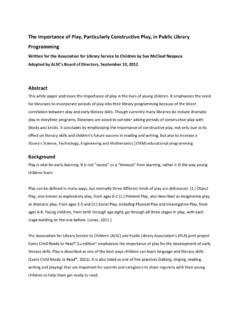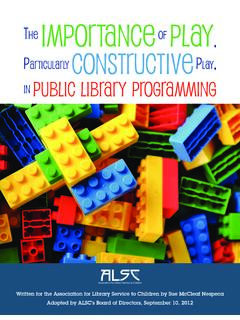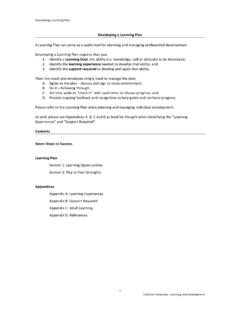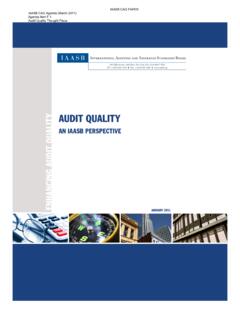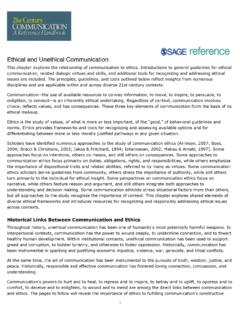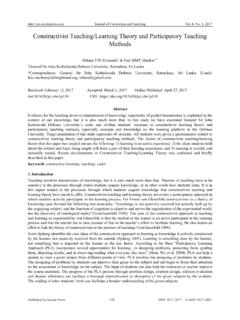Transcription of The Importance of Emotional Intelligence in Nursing Care
1 The Importance of Emotional Intelligence in Nursing CareDiane E. White* PhD, RN, Sharon Grason PhD, RNSchool of Health Sciences, Georgia Gwinnett College, 1000 University Center Lane, Lawrenceville, Georgia 300043, United States of America. Journal of Comprehensive Nursing Research and CareWhite DE, et al. J Comp Nurs Res Care 2019, 4: 152 DetailsArticle Type: Review ArticleReceived date: 07th November, 2019 Accepted date: 21st November, 2019 Published date: 23rd November, 2019 *Corresponding Author: Diane E. White, School of Health Sciences, Georgia Gwinnett College, 1000 University Center Lane, Lawrenceville, Georgia 300043, United States of America. E-mail: White DE (2019) The Importance of Emotional Intelligence in Nursing Care. J Comp Nurs Res Care 4: 152.
2 Doi: : 2019, This is an open-access article distributed under the terms of the Creative Commons Attribution License , which permits unrestricted use, distribution, and reproduction in any medium, provided the original author and source are This article reflects on how professional nurses learn caring behaviors in Nursing school and then transpose those behaviors in the clinical setting. Although Nursing is considered to be one of the most 'trusted' professions and a 'caring for others' profession, often there is a disconnect between this and actual experiences of patients and families in the clinical setting. Nurturing professional growth through Emotional Intelligence will be explored and application of Emotional Intelligence concepts will be applied to the profession of Nursing .
3 The authors contends that by fostering characteristics of Emotional Intelligence , nurses will not only be thought of as 'caring' but will also demonstrate behaviors that 'reconnect' the patient s perception to reality of the care words: Nursing , Care, Emotional IntelligenceIntroduction It is an assumption that professional nurses are caring and demonstrate such behaviors to patients and families; however, anecdotal patient and family stories of their experiences with professional nurses do not always support this premise. Maay, Ester, &Arwam [1] found that caring behaviors by nurses influenced patient satisfaction levels. Additionally, nurses who utilized a patient- centered approach, fostered a sense of 'presence' to the patient that led to better patient outcomes [2].
4 Nurses who do not display this approach may be perceived as uncaring. The origin of these uncaring behaviors could be a result of experiences by the nurses in their Nursing education. Historically the educational environment has been decorated with behaviors that may appear as Emotional hazing to Nursing students. Verbal and written communication is often laced with punitive words and negative connotations, such as 'fail' and 'not allowed.' Constant repetition of negative words leds to insecurity and no empowerment of the student nurse. These negative behaviors are learned and transcend into the practice environment where professional nurses eat their young and has been labeled, 'bullying, incivility, and/or horizontal workplace violence' [3].
5 Often these behaviors go unreported due to fear of retaliation, and lack of administrative support [4]. These behaviors lead to physical and psychological oppression that cause many professional nurses to leave their workplace. These exits contribute to the shortage already noted in the workforce [4]. Instead of repeating these behaviors, leaders should intervene and expect accountability from professional ISSN: 2581-3846nurses and coach them on how to 'care for' and 'care about' others [5,6]. By doing this, nurses will be able to better care for themselves, their colleagues and patients.
6 The benefits to an organization by having patients and families feel they were cared for and cared about can be extraordinary. The Joint Commission [7] and American Nurses Association [8] both require institutions to have policies and procedures in place that promote a culture of safety for health care team members and nurses. This culture is one where employees are treated with respect, is free of incivility and bullying behaviors, and workplace violence. In order to have this culture, nurses and other healthcare professionals need to be coached and mentored on developing this kind of culture. Coaching caring behaviors can be done with intentional efforts toward nurturing professional growth based on Emotional Intelligence .
7 Emotional Intelligence (EI) in healthcare professionals has been studied and particularly with Nursing [9,10]. Lack of Emotional Intelligence results in poor communication and uncivil behaviors such as bullying. Similarly, the Joint Commission [7] reported bullying behaviors linked to increased patient error, higher costs of care, higher turnover rates, lower patient satisfaction scores, and preventable adverse events. While the lack of Emotional Intelligence can cause negative behaviors, the presence of EI has positive effects. Toyama and Mauno [11] found nurses with traits of EI were more apt to have greater social support, work engagement, and creativity. Furthermore, nurses with EI traits were more productive at work and had greater job An analysis of 'caring' demonstrates how caring is grounded in EI.
8 Jenner [12] defined caring as '..intentional, creative use of oneself, based upon skill and expertise, to transmit meaning and emotion to another.' Nursing and caring are grounded in a relational understanding, unity, and connection between the professional nurse and patient. There are five traits of EI: self-awareness, self-regulation, motivation, social awareness (empathy), and relationship management (social skills) [13]. Nurses with self-awareness know how they feel at all times and know how their emotions and actions can affect others. Nurse leaders who have self-awareness have a clear picture of their strengths and weaknesses and behave with humility [14]. Being self-aware allows personal growth through the embracement of constructive feedback.
9 Authentic self-awareness allows the nurse toidentify personal strengths and weaknesses and to be comfortable with Emotional discomfort. For example, a nurse with self-awareness may have different opinions with a colleague, but does not take the differences in opinion personally but rather acknowledges and embraces differences. This sounds easy to do; however, most people, not just nurses, would find this to be the most difficult trait of EI. Self-awareness can be developed through objectively evaluating oneself [15]. Writing down one s strengths and weakness, helps oneself become more aware of themselves. Additionally, being willing to listen to colleagues providing honest and constructive feedback will promote personal and professional growth.
10 Journaling this information along with one s achievements, goals, and plans will allow for self-reflection which fosters self-awareness. Mindfullness and mediation allows individuals to be at a place to better self-reflect and focus on self-awareness. Finally, personality tests exist that may help individuals better learn about traits that influence who they are and thus assist nurses in understanding why they feel and react the way they do personally and professionally. Being self-aware allow nurses to be self-regulated, a second trait of Emotional Intelligence . Self-regulated nurses rarely verbally attack others, make rushed or Emotional decisions, stereotype people, or compromise their values [16]. Self-regulation is all about staying in control.
